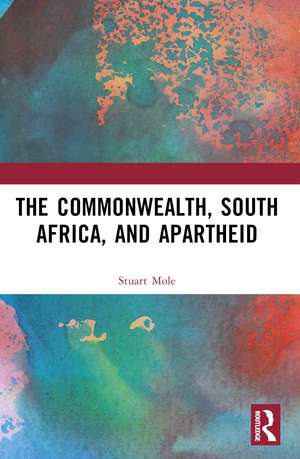The Commonwealth, South Africa and Apartheid: Race, Conflict and Reconciliation
Autor Stuart Moleen Limba Engleză Paperback – 8 oct 2024
| Toate formatele și edițiile | Preț | Express |
|---|---|---|
| Paperback (1) | 261.82 lei 6-8 săpt. | |
| Taylor & Francis – 8 oct 2024 | 261.82 lei 6-8 săpt. | |
| Hardback (1) | 892.99 lei 6-8 săpt. | |
| Taylor & Francis – 31 mai 2023 | 892.99 lei 6-8 săpt. |
Preț: 261.82 lei
Preț vechi: 312.36 lei
-16% Nou
Puncte Express: 393
Preț estimativ în valută:
50.11€ • 51.76$ • 41.70£
50.11€ • 51.76$ • 41.70£
Carte tipărită la comandă
Livrare economică 25 martie-08 aprilie
Preluare comenzi: 021 569.72.76
Specificații
ISBN-13: 9781032077475
ISBN-10: 1032077476
Pagini: 294
Ilustrații: 56
Dimensiuni: 156 x 234 mm
Greutate: 0.54 kg
Ediția:1
Editura: Taylor & Francis
Colecția Routledge
Locul publicării:Oxford, United Kingdom
ISBN-10: 1032077476
Pagini: 294
Ilustrații: 56
Dimensiuni: 156 x 234 mm
Greutate: 0.54 kg
Ediția:1
Editura: Taylor & Francis
Colecția Routledge
Locul publicării:Oxford, United Kingdom
Public țintă
Academic, Postgraduate, and Undergraduate AdvancedNotă biografică
Stuart Mole was for sixteen years a senior officer of the Commonwealth Secretariat as the organisation’s campaign reached its climax. He was the Special Assistant to Shridath ‘Sonny’ Ramphal (the second Commonwealth Secretary-General) and Director and Head of the Office of Chief Emeka Anyaoku (the third Secretary-General). He visited South Africa and the neighbouring states many times as part of the Commonwealth’s campaign. He has just completed seven years of doctoral research into the subject area, culminating in the award, in December 2020, of a History PhD from the University of Exeter. His research, which in some respects has changed his own perceptions, has involved consulting hitherto unseen or neglected archives in the UK and South Africa.
Cuprins
1. Introduction – Whose History?
2. The Decline of the ‘Imperial’ Commonwealth
3. Afrikaner Nationalism and the Rise of Apartheid
4. Sharpeville and South Africa’s Commonwealth Exit
5. The Rhodesian Rebellion, Arms to South Africa and the ‘New’ Commonwealth
6. Boycotting Apartheid in Sport
7. Implementing Gleneagles and Problems of Implementation: From New Zealand to Moscow
8. Zimbabwe’s Birth – Thatcher’s Triumph?
9. Mission to South Africa - Negotiating with Apartheid
10. The Sanctions Campaign and ‘Endgame’
11. Ending Apartheid – A Troubled Transition
12. The ‘Freedom Elections’ and Apartheid’s End
13. The Commonwealth Without a Cause? Apartheid and After
2. The Decline of the ‘Imperial’ Commonwealth
3. Afrikaner Nationalism and the Rise of Apartheid
4. Sharpeville and South Africa’s Commonwealth Exit
5. The Rhodesian Rebellion, Arms to South Africa and the ‘New’ Commonwealth
6. Boycotting Apartheid in Sport
7. Implementing Gleneagles and Problems of Implementation: From New Zealand to Moscow
8. Zimbabwe’s Birth – Thatcher’s Triumph?
9. Mission to South Africa - Negotiating with Apartheid
10. The Sanctions Campaign and ‘Endgame’
11. Ending Apartheid – A Troubled Transition
12. The ‘Freedom Elections’ and Apartheid’s End
13. The Commonwealth Without a Cause? Apartheid and After
Descriere
This book explores the modern Commonwealth’s role in the international campaign against apartheid in South Africa. The author demonstrates that, after the 1960 Sharpeville massacre and South Africa’s subsequent exclusion from the Commonwealth, the organisation became "pathfinder and interlocutor" on the road to South Africa’s freedom.
